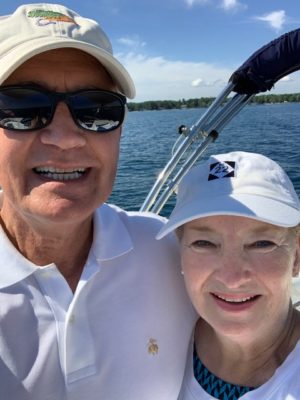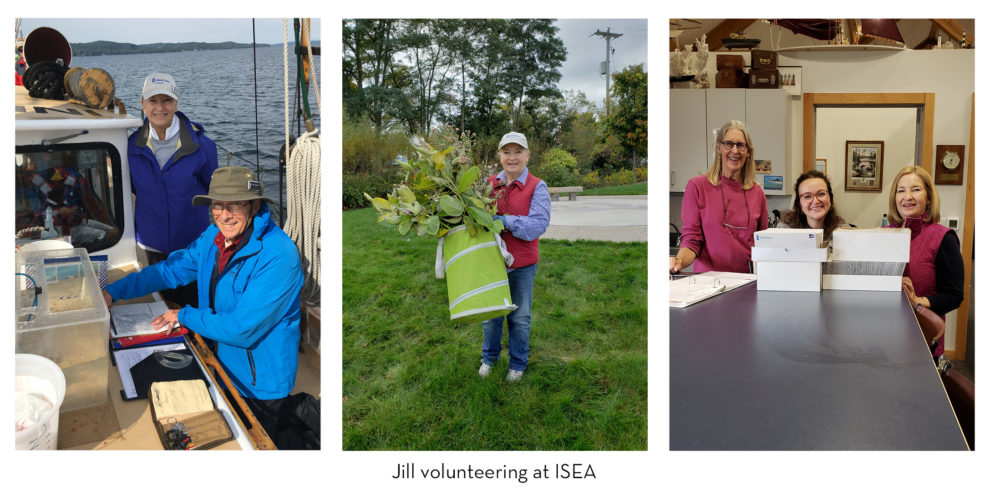From time to time, ISEA will share Great Lakes experiences from guest bloggers. In this blog, volunteer Jill Egan shares how her love of boats and water brought her to Inland Seas and the impact volunteering in retirement has had on her. Email marketing@schoolship.org if you would like to submit a Great Lakes experience to be featured.
You get free rides on a schooner without being a free loader.
You get an expansive education without the confines of a classroom.
You get to meet people from all over the world and sleep in your own bed at night.
Really? Really.

I like boats. I’ve been around boats most of my life. For me they mean fun, escape, family time, challenge, and even mystery. Could I have a trace of Viking DNA from my Swedish heritage? Our Chicago-based family boated and fished on inland lakes in Illinois, Wisconsin, and Minnesota. Attending boat shows and Coast Guard classes was always a highlight of winter. Living on the east coast I was first exposed to the naval vessels and commuter ferries. When we lived on the west coast, I was completely taken by the sea-faring vessels, naval fleet, and container ships that were larger than the buildings on the San Francisco shore.
So, I would be fibbing if I offered some high platitudes about saving the planet as my motivation for my inquiry into volunteering at Inland Seas. I wanted to get out on a boat in the big lake! Checking out ISEA’s website, I saw that crewing requires a person to lift 50 lbs.…phooey; not for me. But I signed up for a free public sail anyway. It was then that an ISEA ambassador volunteer, Sue Chrostek, suggested I become an instructor. No Experience Necessary!
I was highly qualified for “no experience” as an instructor. My career was in healthcare finance and took place in hospitals, offices, and government buildings. Children were not present and science was the purview of the physicians, researchers, and laboratory professionals. My previous volunteer engagement was aligned with my skill set…usually with a human service non-profit.
Advice on how to retire is plentiful. It often revolves around suggestions such as “pursue your passion; learn a new language; stay active.” I would read this and feel frustrated because, other than my love for my family, I had never identified a “passion.” As a wife, mother of two children, and a more-than-full-time job I really didn’t have time to think about such things. Besides, finance folks are not known for being particularly “passionate.” What language should I learn? French? Spanish? Chinese? My brain hurt.
Invited to “shadow” on an ISEA sail in 2017, I absolutely loved it! The children were fun, the weather was perfect, and there was so much to learn! So, I dove in, identifying Seamanship and Fish as stations whose subjects were most familiar to me and less intimidating than Water Quality and Plankton which used chemicals and a microscope. Most appealing, being on the ship was nothing like being in an office; no minutes to write, no long reports to edit, the captain makes decisions without endless debate and the meetings were short. Was it a sailor who pioneered the concept of the short stand-up meeting?
Once I got my head around the concepts in the curriculum, I began to appreciate the elegance of the program. In a couple of hours, key concepts are conveyed in a memorable and approachable way…for all ages. Food web, invasive species, barbels, benthos, copepod, Van Dorn bottle, Secchi Disk, Ponar Grab, Manta trawl…I was learning a new language! Further, the robust data collection and the resultant story would impress any finance professional.
“Food web, invasive species, barbels, benthos, copepod, Van Dorn bottle, Secchi Disk, Ponar Grab, Manta trawl…I was learning a new language!”
Jill Egan
Especially impressive are the staff and their depth of knowledge, commitment, and passion. Highly educated serious scientists, educators, and sailors give ISEA a confluence of talent that makes this program unique among many environmental programs. The staff is also graciously patient with us who are learning and making rookie mistakes along the way (e.g. losing equipment overboard…oops!).
Sharing their knowledge through resources and training, the staff and fellow volunteers have opened up a whole new aspect of our world to me. Never before had I considered the concept of “embracing and caring for” the Great Lakes. They are always just there. As a Chicagoan, I was taught to respect Lake Michigan and its fury; I remember the alewife die-off onshore and zebra mussels suddenly tainting the taste of our drinking water. But, it was ISEA who helped me connect the dots to understand the importance of our amazing Great Lakes and their function as a portal to the rest of the world.

This all brings me to the schooner, Inland Seas. As a bit of a history buff, the oceanic-based society of our entire world prior to the industrial age is a wonderment to me. Navigation, shipbuilding, and commerce conducted by the likes of the Phoenicians, Vikings, the Hanseatic League are mind-boggling. So, I truly appreciate using a schooner for the “classroom,” given the role schooners played as “delivery trucks” on the Great Lakes. Every time the sails are raised, I watch them travel all the way to the top of the mast. Sometimes they get fouled, sometimes they shower us with the previous night’s rain. It’s always a thrill.
Did I mention we have fun? Actually, that is one of the teaching objectives. Helping the students have fun is a path to their developing fondness for the lakes.
Volunteering’s core currency is trust and goodwill. When a person contributes their time, it is very personal and, consciously or unconsciously, one expects a positive result. In recent years, many trusted institutions to which the public has donated time and treasure have yielded disappointment. I think it is especially important when making our contributions, that we are confident the resources are used effectively. It is my observation that Inland Seas Education Association is an organization that exemplifies the stewardship it hopes to inspire.
Jill Egan has been volunteering with ISEA since 2017. She continues to learn through volunteering to teach new stations (like our land-based Map Station) and programs (she began teaching in our Diving Deeper program this year). Her favorite thing to do around the Great Lakes is exploring their history and shoreline from the land and of course the water! When not instructing on the ship, keeping the ISEA grounds beautiful with her husband Jim, or helping out in the office, you can find Jill enjoying time with friends and family, especially their son and daughter and their spouses. To learn more about volunteering with ISEA, visit schoolship.org/volunteer.